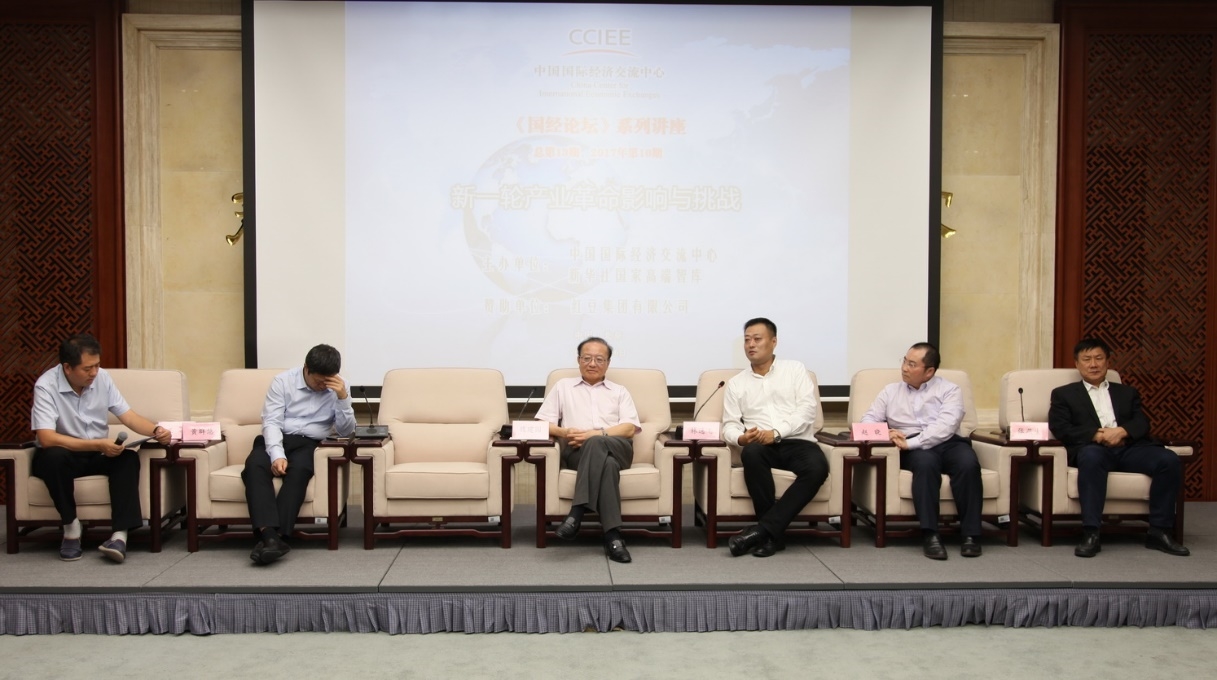13th CCIEE Symposium: The New Industrial Revolution: Impact and challenge
- Time:2017-09-29
- source:CCIEE
On the afternoon of September 26, 2017, CCIEE and Xinhua News Agency National High-end Think Tank co-hosted the 13th “CCIEE Economic Forum”, under the theme of “The New Industrial Revolution: Impact and challenge”. Wei Jianguo, Vice-Chairman of CCIEE, gave an opening remark. Zhang Yansheng, Chief Researcher of CCIEE, Zhao Xiao, Chief Economist of the Cypress Leadership institute, Huang Qunhui, Director of the Institute of Industrial Economics of CASS(Chinese Academy of Social Sciences), and Lin Yufei, partner of Talkingdata, delivered their speeches. Wang Jun, Director of the Information Department, CCIEE, presided over the meeting.

Wei Jianguo said that some of the newly-emerged trend and business model innovation in China have not only been widely applied across China but also exerted greater influence internationally, which equipped China with the capability to lead the new industrial revolution in the future. At the present, however, the new industrial revolution of China is still at the initial stage of development and hence are faced with many challenges, it will produce more benefits once it makes breakthroughs in technology and realizes industrialization. In the next several decades, the new industrial revolution will produce a profound influence on China and change people’s way of living significantly.
Zhang Yansheng pointed out that with the rapid development of the new industrial revolution, the global productivity calculated according to the traditional method, continues to decline, especially in the developed countries. On the one hand, this is due to the fact that a lot of new economic activities are not included in the traditional calculation. On the other hand, the new economy is still at the preliminary stage of development and is far from reaching its breaking point. In the long-term, the new industrial revolution will elevate the growth of global productivity.
Zhao Xiao noted that China has been searching for a new mode of economic development since the so-called “New normal” appeared, consequently, the “New Economy” emerged. Broadly, China’s “New Economy” has obtained considerable progress and plays a great role in the global economy. Nin the future, China successful experience can be learned by countries along the belt and road and other regions around the world. Nonetheless, the new industrial revolution has also brought creative construction to the previous technology, industry and economy, apart from the polarization of wealth distribution. To address these issues, more innovation is needed, including innovation at the institutional level.
Huang Qunhui argued that the new industrial revolution has not been able to make a notable impact on economic growth and in the next two to three decades, it will definitely drive economic growth. Apart from the capital, labor force knowledge and other traditional factors, artificial intelligence will also become an important factor for new economic growth. The source of new economic growth will change from the economies of scale to economies of scope. At the same time, the new economic growth will bring some challenges as well. For instance, the artificial intelligence will replace labor force in many areas, the traditional “smiling curve” will be turned into the so-called “silence curve”, or even “sad curve”. If that happens, the manufacturing chain will go back to the developed countries and it will produce a dramatic shock to China and other developing countries.
Lin Yufei claimed that the new economy has induced exponential growth and led to a large number of unregistered employments, therefore, the traditional statistics and forecast methods cannot be used for analysis. New technologies like the internet and various APP have brought new differentiation to our society, for example, different social classes tend to form different groups on the internet.
At the Q&A sections, the speakers took questions from the audience.
